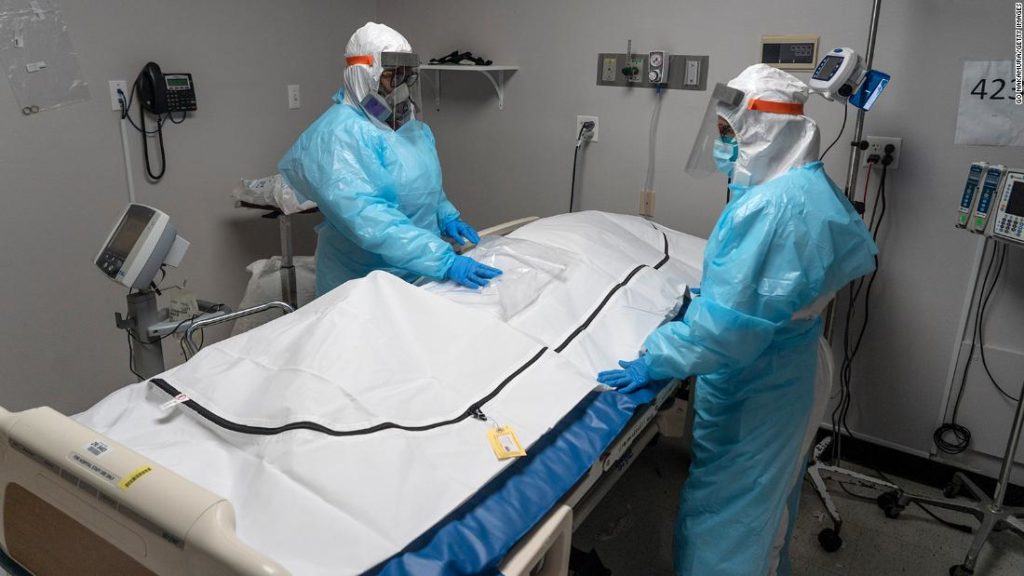The 911 emergency call system is “at a breaking point,” the American Ambulance Association, which represents all of the nation’s ambulance services, said in a letter Wednesday.
“Without additional relief, it seems likely to break, even as we enter the third surge of the virus in the Mid-West and West,” the letter said.
And the Centers for Disease Control and Prevention top official said Wednesday things aren’t likely to look better for hospitals any time soon.
“The reality is December and January and February are going to be rough times. I actually believe they’re going to be the most difficult time in the public health history of this nation, largely because of the stress that’s going to be put on our health care system,” said Dr. Robert Redfield.
Los Angeles tells residents to ‘cancel everything’ in light of spike
States across the US are racing to catch up with the skyrocketing number of coronavirus hospitalizations.
If the coronavirus continues to spread at its current, unprecedented rate, Los Angeles will run out of hospital beds by Christmas, Mayor Eric Garcetti warned in a news conference Wednesday, calling on residents to “hunker down” and “cancel everything” to help stop the spread of the virus.
“The public health condition of our city is as dire as it was in March in the earliest days of this pandemic,” he said, adding that the number of daily coronavirus infections in Los Angeles have tripled since early November and hospitalizations are at a new peak.
In the Southwest region of Kansas, Gov. Laura Kelly said Wednesday there are no staffed ICU beds available.
“While case numbers may have dipped slightly, the strain on our hospitals and health care workers has not,” she said.
Coronavirus hospitalizations in Nevada have been climbing daily since November, with few exceptions, and were at a peak Wednesday with 1,652 people hospitalized, the state’s dashboard shows.
100 million Americans could be vaccinated by February, Operation Warp Speed adviser says
There may still be ways to go before the wider public has access to a coronavirus vaccine, but developments are moving quickly.
By February, 100 million Americans could be vaccinated against coronavirus, Moncef Slaoui, chief adviser to Operation Warp Speed, said Wednesday.
“All the investments we have made in scaling up and starting to stockpile manufacturing of the vaccines allow us to stay confident that we will be able to distribute 20 million vaccines, enough to vaccinate 20 million people in the US in December,” Slaoui said in a news briefing.
The United States has said if both Pfizer and Moderna win Food and Drug Administration emergency use authorization in December, they could distribute 40 million doses of the vaccine by the end of the month. Each vaccine requires two doses, so that’s enough to fully vaccinate 20 million people.
Slaoui said he expected 60 million more vaccines by the end of January.
An FDA panel is expected to meet about whether to authorize the Pfizer and Moderna vaccine candidates on December 10 and December 17, respectively.
Assuming the vaccines are authorized, the first shipments could happen December 15 and 22, respectively, according to a document from the federal government’s Operation Warp Speed.
A CDC panel recommended Tuesday that heath care and long-term care workers get inoculated first.
CNN’s Steve Almasy, Jason Hanna, Shelby Lin Erdman, Raja Razek, Maggie Fox, Andrea Diaz, Jamie Gumbrecht, Jennifer Henderson, Rebekah Riess, and Lauren Mascarenhas contributed to this report.
You may also like
-
UK coronavirus variant has been reported in 86 countries, WHO says
-
NASA technology can help save whale sharks says Australian marine biologist and ECOCEAN founder, Brad Norman
-
California Twentynine Palms: Explosives are missing from the nation’s largest Marine Corps base and an investigation is underway
-
Trump unhappy with his impeachment attorney’s performance, sources say
-
Lunar New Year 2021: Ushering in the Year of the Ox

